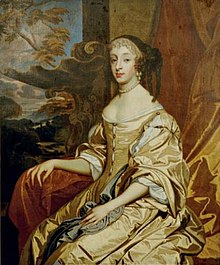Windsor Beauties


The Windsor Beauties are a set of portrait paintings, still in the Royal Collection, by Sir Peter Lely and his workshop, produced in the early to mid-1660s, that depict ladies of the court of King Charles II, some of whom were his mistresses.[1][2] The name stems from the original location of the collection, which was at Windsor Castle. In 2024, they were on display at Hampton Court Palace.
A set of copies was commissioned by Robert Spencer, 2nd Earl of Sunderland, in the 17th century for his collection at Althorp House, and the complete set can still be viewed there in the Picture Gallery, a room he created to show off his adoration for art.[3]
The portraits
[edit]

The Royal Collection includes 10 portraits as part of the set. They show the women at three-quarter length in various poses. Some women wear current fashions; others are draped in loose robes intended to evoke classical antiquity.
Originally commissioned by Anne Hyde, Duchess of York, the first mention of the paintings is by Samuel Pepys, describing them in his diary as being hung in "the Duke of York's room" in 1668.[4] A 1674 inventory lists them as in the ducal rooms at St. James Palace;[5] and by 1688 they had moved to the "Princess's dressing room" at Windsor Castle. Moved to the castle's state rooms during the 18th century, the Windsor Beauties were transferred to Hampton Court at some time prior to 1835.[4]
List of "Beauties"
[edit]The original set of "Beauties" painted by Lely include, depending on the source, these 12 portraits:
- Frances, Duchess of Richmond and Lennox (née Stuart)[6][7]
- Elizabeth, Countess de Gramont (née Hamilton)[6][7]
- Jane Myddelton (née Needham)[6][7]
- Margaret, Lady Denham (née Brooke; named Elizabeth in the cited printed sources [and in 18th century prints] but Margaret at the Royal Collection)[6][7]
- Frances, Lady Whitmore (née Brooke)[6][7]
- Mary, Countess of Falmouth and Dorset (née Bagot; named Elizabeth in the cited printed sources [and in 18th century prints] but Mary at the Royal Collection)[6][7]
- Henrietta, Countess of Rochester (née Boyle)[6][7]
- Barbara, Duchess of Cleveland (née Villiers)[6][7]
- Anne, Countess of Sunderland (née Digby)[6]
- Elizabeth, Countess of Northumberland (née Wriothesley)[6][7]
- Emilia Butler, Countess of Ossory[6] (Melville omits this name, citing Ernest Law that the portrait previously identified by this name is actually Lady Falmouth)[7]
- Madame Henrietta, Duchess of Orléans[7]
The portraits for the first 10 names are included at the Royal Collection website as "probably commissioned by Anne Hyde, Duchess of York."
The Duchess of York does not figure in the above list often; but since she was largely responsible for the collection, and choosing the sitters, she was also painted as part of the series. Possibly a little flattery from Lely was responsible for this.
Gallery
[edit]-
Jane Needham, Mrs Myddleton, c. 1663–65
-
Margaret Brooke, Lady Denham, c. 1663–65
-
Frances Brooke, Lady Whitmore, c. 1665
-
Mary Bagot, Countess of Falmouth and Dorset, c. 1664–65
-
Henrietta Boyle, Countess of Rochester, c. 1665
-
Barbara Villiers, Duchess of Cleveland, c. 1665 (as Minerva)
See also
[edit]- Hampton Court Beauties, a later set by Sir Godfrey Kneller, also on display at Hampton Court Palace
- Gallery of Beauties, a still later set in Munich
References
[edit]- ^ Jones, Robert W (1998). Gender and the Formation of Taste in Eighteenth-Century Britain: The Analysis of Beauty. Cambridge University Press. ISBN 9780521593267. Retrieved 25 April 2019.
- ^ Hamilton, Adrian (16 April 2012). "Carry on, your majesty: Charles II and his court ladies". The Independent. Retrieved 25 April 2019.
- ^ Spencer, Charles, Althorp: The Story of an English House.
- ^ a b Alexander, Julia Marciari; MacLeod, Catharine (2007). Politics, Transgression, and Representation at the Court of Charles II. Yale Center for British Art. pp. 81–82. ISBN 9780300116564.
- ^ Wenzel, M. (1 November 2002). "The Windsor Beauties by Sir Peter Lely and the collection of paintings at St James's Palace, 1674". Journal of the History of Collections. 14 (2): 205–213. doi:10.1093/jhc/14.2.205. ISSN 0954-6650.
- ^ a b c d e f g h i j k Cunningham, Peter (1865). "The Early Painters of England: Peter Lely". The Art Journal. 27 (Vol. 4, New series): 8.
- ^ a b c d e f g h i j k Melville, Lewis (2005). The Windsor Beauties: Ladies of the Court of Charles II (Revised ed.). Ann Arbor: Victorian Heritage Press. pp. i. ISBN 1-932690-13-1.
External links
[edit]- 58 minute video by Dr Lawrence Shafe, "The Windsor Beauties at Hampton Court"
- Timms, Elizabeth Jane, "Looking at the Women behind the Windsor Beauties", 11 October 2017
- Search for Windsor Beauties by Sir Peter Lely at the Royal Collection website, example (direct link)
- The Windsor Beauties: Ladies of the Court of Charles II by Lewis Melville. Loving Healing Press, 2005. ISBN 1-932690-14-X, ISBN 978-1-932690-14-9.









